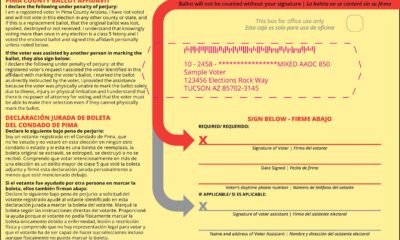2024 Election News
Judge Sides with Justice: A Win for Democracy in Election Lawsuit

In a significant ruling, Maricopa County Superior Court Judge Melissa Julian has directed Republican lawmakers to amend their portrayal of an initiative aimed at instituting open primaries in Arizona. The ruling stems from concerns that the current description misleads voters regarding the implications of Proposition 140.
Judge Julian acknowledged that while the description included all relevant provisions for Proposition 140, its arrangement was deliberately misleading. She stated that the intent behind this structuring was to deter voter support for the initiative.
In response, the judge has mandated the Republican-controlled Legislative Council, responsible for drafting the description, to address these issues. However, House Speaker Ben Toma has indicated plans to appeal the decision, delaying any potential changes.
The initiative, commonly referred to as an “open primary” but more accurately described as a “jungle primary,” would eliminate partisan primaries in favor of a single, nonpartisan election format where all candidates compete simultaneously, regardless of their party affiliation. This would allow any voter to participate regardless of their registration status.
Proponents, including the group Make Elections Fair, advocate for this change as a means to enhance voter inclusivity and choice in determining who progresses to the general election. They argue that the current system restricts candidates to those appealing predominantly to core party supporters.
The existing party-centric primaries often allow the majority party to effectively decide the election outcome in districts, skewing representation in subsequent general elections.
According to state law, the Legislative Council must produce an “impartial” description of ballot measures. Julian affirmed that the current council-approved summary does convey the primary changes but underscored that it misleadingly emphasizes the ranked-choice voting mechanism without clarifying its conditional use.
Judge Julian criticized the council for presenting the ranked-choice voting option first, arguing that it misrepresented the primary election changes by suggesting that the initiative would eliminate the traditional system where the candidate with the most votes wins. This selective emphasis could lead to voter confusion, she noted.
Julian’s ruling highlighted that the inclusion of ranked-choice provisions upfront could mislead voters into believing that the current majority-vote system would no longer apply in all elections, which she deemed inaccurate.
The judge pointed out that the description fails to adequately clarify the circumstances under which ranked-choice voting would be implemented, allowing lawmakers to decide how many candidates advance to the general election.
This ruling, however, does not determine the fate of Proposition 140 on the ballot. A separate judge recently affirmed that the initiative complies with regulations prohibiting multiple issues from appearing on a single ballot measure.
Despite this, the Arizona Free Enterprise Club continues to challenge the validity of some signatures gathered for the initiative, arguing that improperly registered circulators may jeopardize the measure’s qualification for the November ballot. Hearings regarding this issue are ongoing this week.

















